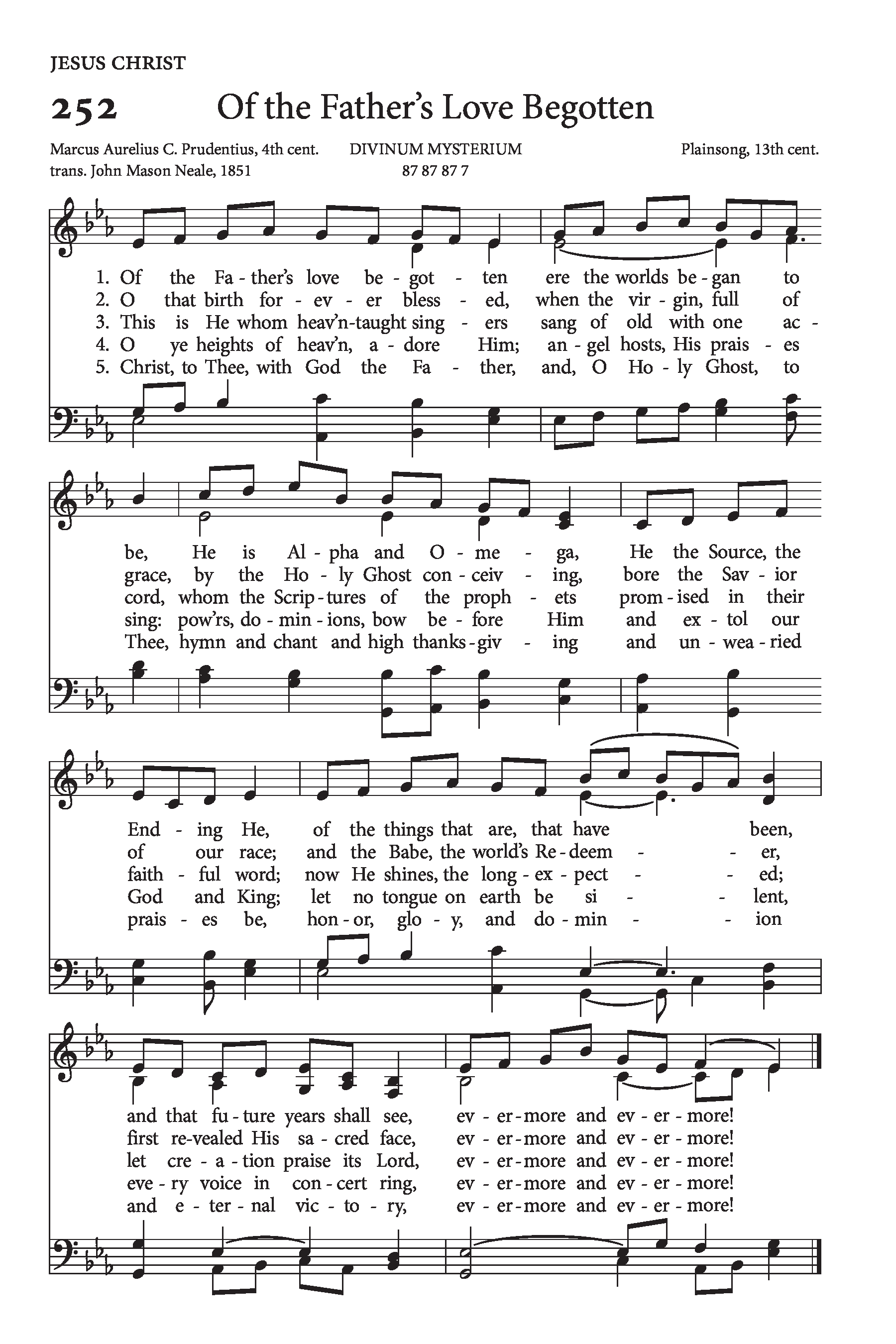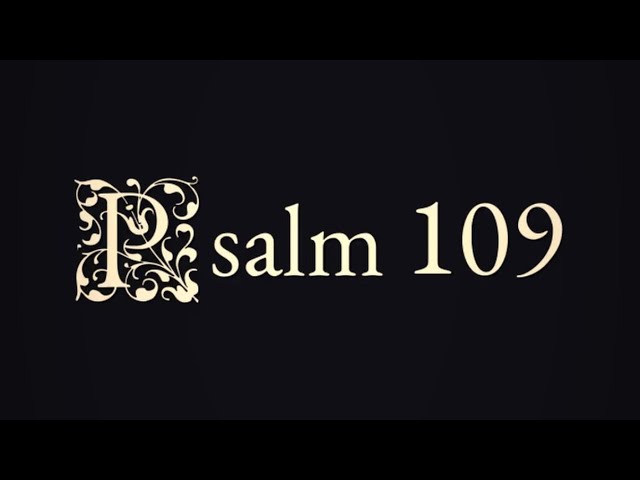Of the Father's Love Begotten
By J. M. Neale
Lyrics
Ere the worlds began to be,
He is Alpha and Omega,
He the source, the ending He,
Of the things that are, that have been,
And that future years shall see,
Evermore and evermore.
He commanded, it was done:
Heav’n and earth and depths of ocean,
In their threefold order one;
All that grows beneath the shining
Of the moon and burning sun—
[Evermore and evermore.]
Death and sorrow here to know,
That the race of Adam’s children,
Doomed by law to endless woe,
May not henceforth die and perish
In the dreadful gulf below—
[Evermore and evermore.]
When the virgin, full of grace,
By the Holy Ghost conceiving,
Bore the Savior of our race,
And the babe, the world’s Redeemer,
First revealed his sacred face—
[Evermore and evermore.]
Chanted of with one accord,
Whom the voices of the prophets
Promised in their faithful word;
Now he shines, the long-expected;
Let creation praise its Lord—
[Evermore and evermore.]
Angel hosts his praises sing!
All dominions bow before him
And exalt our God and King.
Let no tongue on Earth be silent,
Every voice in concert ring—
[Evermore and evermore.]
And O Holy Ghost, to thee,
Hymn and chant and high thanksgiving
And unwearied praises be,
Honor, glory, and dominion,
And eternal victory—
[Evermore and evermore.]
Bible Reference
John 1:1–3
About This Hymn
“Of the Father’s Love Begotten” is one of the oldest hymns still sung in Christian worship today. Its text was originally written in Latin by the Roman poet Aurelius Clemens Prudentius around the year 405. Prudentius, a Spanish Christian lawyer and poet, composed this hymn as part of his larger work Cathemerinon, a collection of devotional poems designed for different hours of the day and seasons of the church year. The hymn is a majestic meditation on the eternal nature of Christ, celebrating His divine role in creation and His incarnation for the salvation of mankind. Its sweeping language reflects the theology of the early church, emphasizing that Christ is both eternal and begotten of the Father before all worlds, underscoring the doctrine of the Trinity.
The Latin text was later translated into English by John Mason Neale, one of the leading figures in the 19th-century Oxford Movement, and further refined by Henry W. Baker. Neale’s translation preserves the hymn’s reverent tone and rich theology, making it accessible for English-speaking congregations. The words proclaim the timelessness of Christ’s reign and the fulfillment of Old Testament prophecy through His birth, drawing deeply from Scripture such as John 1:1–3, Isaiah 9:6, and Micah 5:2. Its poetry encourages believers to worship Christ not only as the infant in Bethlehem but as the eternal Word who has always been and always will be.
The hymn is traditionally sung to the plainchant melody Divinum Mysterium, a melody dating back to the 12th century. This pairing of ancient text and medieval chant gives the hymn a contemplative, worshipful tone that has endured for centuries. It is particularly beloved during the Advent and Christmas seasons, inviting worshippers to reflect on the mystery of the incarnation. The chant-style tune, with its flowing, modal character, emphasizes the timeless quality of the text and its focus on Christ’s divinity.
Prudentius, the original author, was a Roman Christian poet who wrote extensively after retiring from public service. His writings bridged classical Roman literature with emerging Christian theology, and “Corde natus ex Parentis” is considered one of his finest contributions to Christian hymnody. The hymn’s survival for over 1,600 years demonstrates its theological depth and its role in uniting believers across cultures and centuries in praise of Christ. Through Neale’s translation and Baker’s contributions, this ancient hymn found a place in the English Hymns Ancient and Modern hymnal in 1861, cementing its popularity. Today, it continues to inspire awe and reverence, standing as a testament to the enduring truth that Jesus Christ is eternally begotten of the Father, uncreated, and the source of all creation.


📬 Subscribe to Our Devotional Updates
Receive weekly hymns, devotionals, and website features directly in your inbox.
Hymn Information

- Category: Hymn
- Author/Writer: J. M. Neale (1851)
- Added: August 24, 2025
- Last Updated: August 24, 2025
- Views: 1764
MIDI File
Popular Hymns
Recent Blog Posts
Popular Blog Posts
Visit Us on Social Media
Latest from X (Twitter)
Tweets by HymnalLibraryLatest from Facebook
Latest on YouTube
Daily Bible Verse
Disclaimer
The hymns, sheet music, MIDI files, and related content on this website are provided for educational and research purposes only.
- Public Domain: Many of the hymns featured here are in the public domain and may be freely used.
- Copyrighted Works: Some hymns may still be under copyright protection. Where applicable, permission has either been requested from the copyright owner, or the content is shared under the principles of fair use for educational purposes.
⚠️ Important Notice: If you wish to reproduce, distribute, or use any copyrighted hymn beyond personal study or educational use, you must obtain permission directly from the copyright holder. This website does not grant any rights for commercial use yet.
If there is any other question please address it to us in our Contact Page, for further assistance. Thank you for using the site. May God Bless You.












